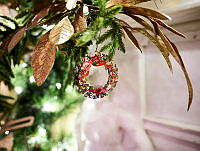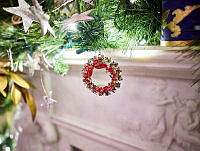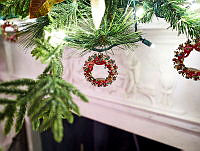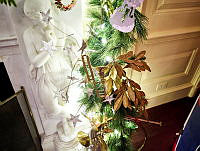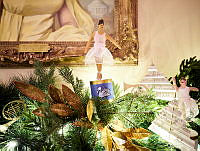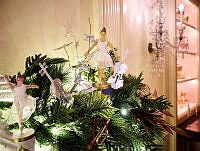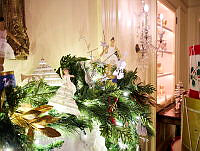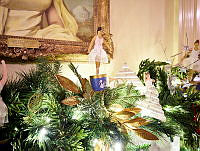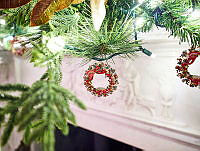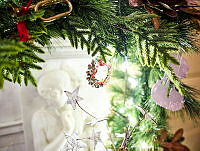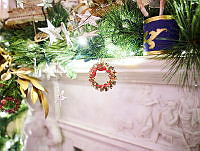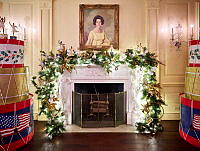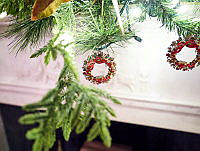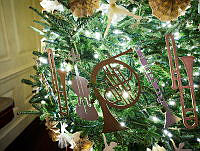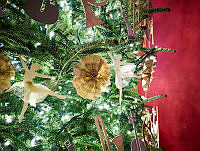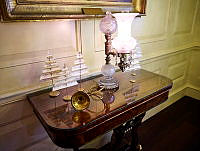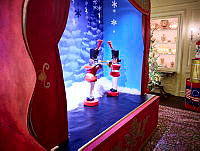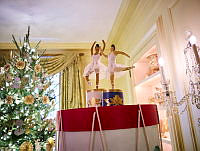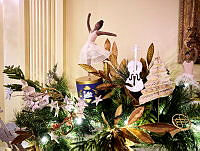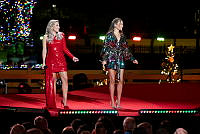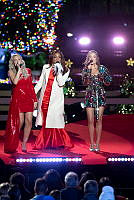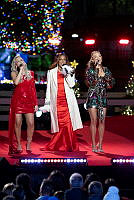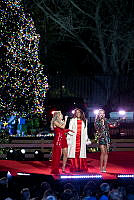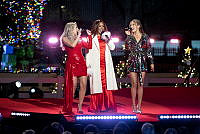Music in Lincoln's White House
Copyright © White House Historical Association. All rights reserved under international copyright conventions. No part of this article may be reproduced or utilized in any form or by any means, electronic or mechanical, including photocopying, recording, or by any information storage and retrieval system, without permission in writing from the publisher. Requests for reprint permissions should be addressed to books@whha.org
Abraham Lincoln was one of America’s most unmusical presidents. He could neither play an instrument nor carry a tune, yet he had a passionate love of music. Many times he left the White House during his tenure to attend the opera at Washington theaters, and when duties held him to the mansion, he invited performers to entertain him and his family “at home.” For Lincoln, however, music was more than mere entertainment. It was a form of therapy, a panacea, a way to touch the soul of beauty. Friends noted that his reaction to the mysterious powers of music was often intense and highly personal. Certain songs would “mist his eyes and throw him into a fit of deep melancholy.”1
Lincoln had been responsive to music from his earliest boyhood days, when his mother, Nancy Hanks, sang lyrical ballads to him. For the young man in America’s frontier wilderness, songs such as “Kathleen Mavoumeen,” “Old Rosin the Beau,” and “Annie Laurie” had their own special poignancy and charm. Lincoln’s musical friend from the Shenandoah Valley, Ward Lamon, once recalled: “Many a time, in the old days on the Illinois circuit, and often at the White House when he and I were alone, have I seen him in tears while I was rendering in my poor way that homely melody [‘Twenty Years Ago’].”2 But Lamon had a way of cheering Lincoln, too. His interpretation of the spirited banjo tune “The Blue Tail Fly” was a special favorite with the president. With its comic lyrics and syncopated beat, this type of song formed the core of the popular new minstrel shows of the time.
If Lincoln’s tastes in music were eclectic, they were perhaps no more so than those of most Americans. But music in those days was not as clearly delineated into “popular” and “classical” as it is today. There were no CD bins in music stores, no videos, iPods, or TVs, and no radios or movies to provide entertainment and respite from everyday cares. Theaters with live performers, therefore, were kept very busy. And while Ford’s Theatre and Grover’s Theater showcased plays, tableaux, and revues, they also presented fully staged operas. Most of these were produced on East Coast tours by New York’s elegant new Academy of Music. Thus, Washingtonians, young and old, enjoyed the greatest operas of Gioacchino Rossini, François-Adrien Boieldieu, Wolfgang Amadeus Mozart, Richard Wagner, Giuseppe Verdi, Vincenzo Bellini, Gaetano Donizetti, Carl Maria von Weber, Giacomo Meyerbeer, and Ludwig van Beethoven, and President Lincoln saw most all of them.3
Friends noted that his reaction to the mysterious powers of music was often intense and highly personal. Certain songs would “mist his eyes and throw him into a fit of deep melancholy.”
Lincoln attended the opera more than thirty times during the four years he was in the White House. He had never heard an opera before his election to the presidency. Sometimes he went with First Lady Mary Todd Lincoln or with friends, but often alone. He especially liked Charles- François Gounod’s Faust with its rousing “Soldiers’ Chorus,” which he saw at least four times. When criticized for attending the opera so much while real life dramas raged at Bull Run and Harpers Ferry, he retorted: “The truth is I must have a change of some sort or die.”4 His passion for opera, in fact, was so pronounced that at one point the New York Herald suggested that President Lincoln visit Manhattan, “where Mrs. Lincoln can shop, and the president can have his fill of opera.”5 But opera in New York also had a darker tone for him. When Lincoln attended his first opera on February 20, 1861, two weeks before his inauguration, it was the American premiere at the Academy of Music of Giuseppe Verdi’s Masked Ball—the story of a monarch’s brutal assassination. For Lincoln it was a chilling prophecy.6
While her artistic interests were not as fervid as the president’s, Mary Todd Lincoln found her own special joy in music. Shortly after moving into the White House, she ordered a fine new grand piano made by the Schomacker Company of Philadelphia (c. I860).7 With its one-piece cast-iron frame and graceful foliate carving, the piano occupied a prime spot in the lush, Victorian-style Red Room, Mrs. Lincoln’s favorite sitting room. Here the two unruly Lincoln boys, Willie and Tad, took music lessons from their Polish instructor, Alexander Wolowski. The scholarly professor had recently set up a studio in Washington and styled himself “court musician” to the Lincolns. But the Schomacker piano had other important duties. It became the focal point for many musical programs that the Lincolns held in the White House—entertainment as varied as the president’s own preferences and as kaleidoscopic as American taste itself.
When the Lincolns invited the young American opera singer Meda Blanchard to perform for them in the White House, they were unaware that they had inaugurated an important American cultural tradition. Since that time, literally hundreds of fine singers have entertained at important White House functions for every American president to modern times.8 Forgotten today, Meda Blanchard had studied abroad, and as the Sunday Morning Chronicle of June 30, 1861, proudly reported, “She returns to America laden with the highest encomiums.”9

During his presidency, Lincoln attended many opera productions in Washington. In May 1862 he saw the 19-year old American, Clara Louise Kellogg in Gaetano Donizetti’s Daughter of the Regiment.
Library of CongressAt her program for the Lincolns and their guests in July 1861, the young diva sang “in a manner that charmed everyone present.” Seated at the piano, she “laid off the shawl from shoulders that no ‘South’ would have ever seceded from [with its eyes open],” wrote the press.10 Among her selections was the famous “Casta Diva” from Bellini’s Norma and two of Lincoln’s favorite ballads. At the president’s request, she finished up with the “Marseillaise.” Four days later the Lincolns attended Blanchard’s concert at Willard’s. The Evening Star noted that “our Republican President seemed to have been oblivious to the cares of office and wholly absorbed by the syren [sic] voice of the fair cantatrice.”11 As for the young singer, did it matter that she would never soar to stellar heights? She had sung for the president. He had even sent her a bouquet of flowers.12
If the president craved diversion from the increasing gloom of the war, he found it in four disparate entertainers, whom he welcomed on different occasions at the Executive Mansion: a Native American soprano, a P. T. Barnum entertainer, a nine-year-old piano prodigy, and a vocal ensemble that, beginning with John Tyler, would sing for a total of seven presidents. Several months before Meda Blanchard sang, another young woman presented a program for the president and his guests at a White House reception. She was called simply “Larooqua,” and the papers noted her “woodnotes wild” and “mellifluous voice.”13 Probably politics as much as artistry brought the young Native American to the White House. She was in Washington at the time assisting John Beeson, who was giving a series of lectures on the plight of the Indians in Oregon. But there would not be another like her until Chief Yowlache of the Yakima tribe of Washington sang for President Herbert Hoover in 1933.
When Commodore Nutt entertained President and Mrs. Lincoln on October 17, 1862, the distressed president had just witnessed his darkest hour through the disastrous carnage at Fredericksburg. To brighten his spirits—if even for a moment—the great American showman, Phineas T. Barnum, brought one of his stars to the White House. The gentleman, 29-inches-high, barely reached the president’s knee. Advertised in the National Republican of October 17, 1862, as the “smallest man in the world,” George Washington Morrison Nutt was also considered a very fine entertainer. He delighted the president and his cabinet with his interpretation of David T. Shaw’s “Columbia, the Gem of the Ocean,” a song made popular recently at concerts in Boston, New York, and Philadelphia.14

Commodore George Washington Nutt a 29-inch tall singer, was brought to the White House in 1862 to entertain President Abraham Lincoln, who was distressed following the Battle of Fredericksburg.
Library of CongressAnother small White House entertainer went on to become one of the century’s finest concert pianists. The amazing Venezuelan prodigy, Teresa Carreño, was only nine when she came to the White House with her father in the fall of 1863. But she exhibited the temperament that was to become her hallmark. Recalling the event in her later years, she wrote: The President and his family received us so informally, they were all so very nice to me that I almost forgot to be cranky under the spell of their friendly welcome. My self-consciousness all returned, however, when Mrs. Lincoln asked me if I would like to try the White House grand piano. . . . Without another word, I struck out into Gottschalk’s funeral Marche de Nuit, and after I had finished, modulated into The Last Hope, and ended with The Dying Poet. . . . Then what do you think I did? I jumped off the piano stool and declared that I would play no more—that the piano was too badly out of tune to be used.15
Though the vertiginous pieces by Louis Moreau Gottschalk were meaty fare for a nine-year-old, Carreno’s complaints about the piano were not alone. When the Hutchinson Family Singers sang for the Lincolns’ reception on January 7, 1862, John Hutchinson remarked: “We suffered a slight inconvenience in singing ... no music stool could be found, and altogether it was evident that Mr. Lincoln and his family were thinking of something else than music in those days.” Hutchinson felt that it would be “little less than treason” to attempt “Yankee Doodle” on the out-of-tune piano, so he sent for his melodeon instead. At the president’s request he played Henry Russell’s dramatic “Ship on Fire,” a descriptive American classic that had all the earmarks of a D. W. Griffith silent film score. “I can seem to see our martyred President now as he stood only a few feet from me, holding his sweet boy, Tad, by the hand,” wrote Hutchinson. “We were warmly applauded as our program concluded. The room was as full as it could be.”16

Among the many performers who entertained in President Abraham Lincoln's White House were the Hutchinson Family (above c. 1880) a nineteenth-century American family singing group who for generations sang about social issues and political causes. In various combinations, the group sang for seven presidents.
Library of CongressWhile guest artists were still relatively infrequent at the White House, one musical ensemble had been an integral part of the mansion’s cultural life from its earliest days—the United States Marine Band. Appearing first at the White House for John Adams’s New Year’s Day reception in 1801, the band became known as “The President’s Own” from the time of Thomas Jefferson. On July 25, 1861, President Lincoln established the first act to recognize the Marine Band by law, and the ensemble, now greatly enlarged, played for nearly every White House ceremonial and social event. Public band concerts, begun by President John Tyler, were also held weekly on the White House grounds. The only exception was a period of almost two years when Mrs. Lincoln ordered them to cease after the death of her son Willie.
The repertory of the Marine Band in those days was unusually large and varied. In addition to polkas, waltzes, and quicksteps, there were numerous selections from opera, for lyrical opera tunes were “popular music” to many Americans—rather like Broadway show tunes are to us today. The tradition of Italian opera was also born into the distinguished Marine Band leader, Francis Scala, who had come to America in 1842 from his native city of Naples. When he left the band in 1871, Scala had served under nine presidents and had greatly improved the balance, technique, and repertory of the ensemble.
Although Lincoln attended the Marine Band concerts whenever he could, an account written at the time only underlines what little peace he had to pursue his own pleasures. One Saturday afternoon, when the lawn was crowded with people enjoying the concert, the president appeared on the portico. “Instantly there was a clapping of hands and clamor for a speech. Bowing his thanks, and excusing himself he stepped back into the retirement of the circular parlor, remarking with a disappointed air, as he reclined upon the sofa, ‘I wish they would just let me sit out there quietly, and enjoy the music.’”17

Artists of the period sometimes exaggerated the size of the East Room of the White House, as in this hand-colored wood engraving entitled Grand Presidential Party at the White House, Washington—Wednesday Evening February 5th, which was published in Frank Leslie’s Illustrated Newspaper on February 22, 1862. Five hundred guests were invited to this grand gala, which featured an elaborate buffet and music by the Marine Band, performing in the Entrance Hall (seen in the distance through the open doors on the left). Although the Marine Band usually provided the music at social and ceremonial events, it was often crushed by the festive crowds.
White HouseCollectionBut the music closest to Lincoln were those tones bound most intimately with Americans during their turbulent war years—melodies that revealed the spirit of a people who knew the powers of both tragedy and joy, defeat and victory. “We are coming, Father Abraham, three hundred thousand more!” sang thousands of volunteer soldiers before the White House, responding to the president’s call. Strong men cheered, cried, and bellowed out George F. Root’s immortal “Battle Cry of Freedom”—“Yes we’ll rally round the flag, boys, we’ll rally once again!” On July 4, 1864, thousands of African Americas gathered on the White House lawn to sing spirituals commemorating both Independence Day and the Emancipation Proclamation. And on January 27, 1865, five hundred members of the Christian Commission called on the president, singing various hymns and the “Soldiers’ Chorus” from Gounod’s Faust.
After the fall of Richmond, crowds gathered at the White House far into the night. They waved flags and serenaded victory with Julia Ward Howe’s “Battle Hymn of the Republic” and vaudeville star Dan Emmett’s “Dixie.” “Let’s have it again!” cried the president, who first heard “Dixie” at a minstrel show in Chicago. “It’s our tune now!” he said, implying that both North and South would find unity and fellowship in this common musical expression.18 How deeply the president was moved by musical demonstrations has been recorded by those close to him. He was known to have called for certain pieces again and again.
As a student in a rugged school, I have through life been obliged to strip ideas of their ornaments, and make them facts before I conquered them....Still a few, soft heart-searching notes will often remind me of a want, convincing me that, like other hard workers, I may have gained in precision and concentration at the cost, maybe, of the silent pleasure an eye educated to beauty can always drink in at a glance.
A philosopher once said that music reaches beyond language and expresses our highest and deepest longings. But for Abraham Lincoln music was much more. “Listening to melody,” he once said, "every man becomes his own poet, and measures the depths of his own nature, though he is apt to lose the line as the sound dies away. As a student in a rugged school, I have through life been obliged to strip ideas of their ornaments, and make them facts before I conquered them....Still a few, soft heart-searching notes will often remind me of a want, convincing me that, like other hard workers, I may have gained in precision and concentration at the cost, maybe, of the silent pleasure an eye educated to beauty can always drink in at a glance." 19
Perhaps we find a little bit of ourselves in these words. But more important, we gain fresh insight into this dedicated leader, his lively curiosity, his sensitivity, and his soul.













